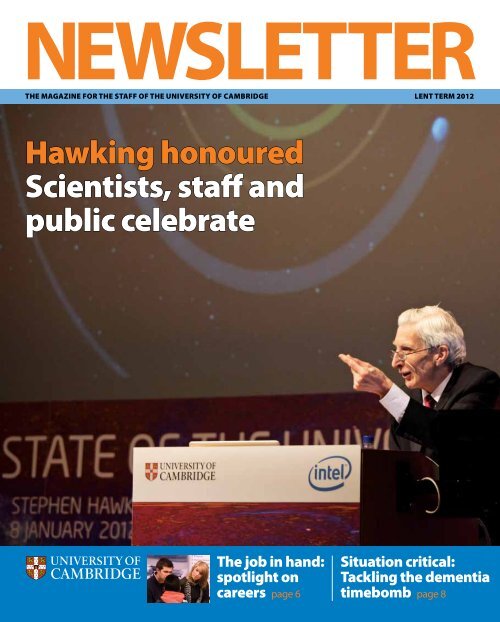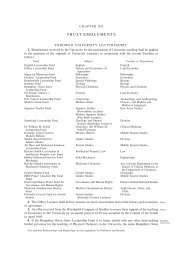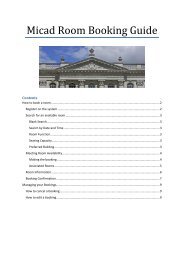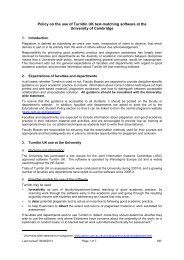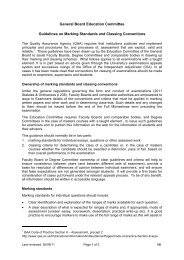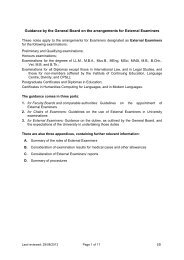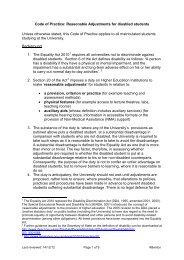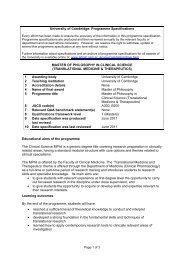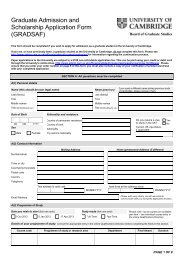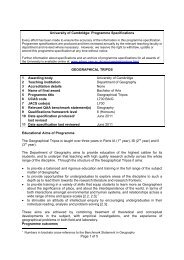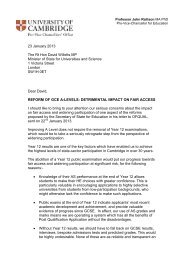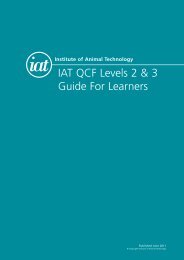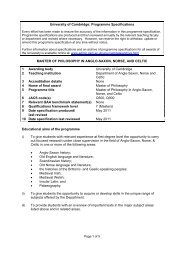January/February - the University Offices - University of Cambridge
January/February - the University Offices - University of Cambridge
January/February - the University Offices - University of Cambridge
You also want an ePaper? Increase the reach of your titles
YUMPU automatically turns print PDFs into web optimized ePapers that Google loves.
The magazine for <strong>the</strong> staff <strong>of</strong> <strong>the</strong> <strong>University</strong> <strong>of</strong> <strong>Cambridge</strong> lent term 2012<br />
Hawking honoured<br />
Scientists, staff and<br />
public celebrate<br />
The job in hand:<br />
spotlight on<br />
careers page 6<br />
Situation critical:<br />
Tackling <strong>the</strong> dementia<br />
timebomb page 8
snapshot<br />
Fun for kids: Twilight at <strong>the</strong> Museums, a<br />
once-in-a-year opportunity for families to<br />
visit <strong>University</strong> museums and collections<br />
after dark, returns on 15 <strong>February</strong>. This<br />
year will see Kettle’s Yard, <strong>the</strong> Museum <strong>of</strong><br />
Technology and <strong>the</strong> Farmland Museum<br />
at Denny Abbey take part for <strong>the</strong> first<br />
time. Fur<strong>the</strong>r details on participating<br />
institutions, opening times and bookable<br />
events are available at www.cam.ac.uk/<br />
twilight. For fur<strong>the</strong>r ideas on half-term<br />
activities visit http://www.admin.cam.<br />
ac.uk/whatson/<br />
Red hot: An exhibition <strong>of</strong> photographs<br />
examining volcanoes, volcanic eruptions<br />
and <strong>the</strong>ir hazards and consequences<br />
has opened at PandIS and runs until<br />
5 April. Presented by Dr Peter Baxter, <strong>of</strong><br />
<strong>the</strong> Department <strong>of</strong> Public Health and<br />
Primary Care, and Dr Clive Oppenheimer,<br />
<strong>of</strong> <strong>the</strong> Department <strong>of</strong> Geography, <strong>the</strong><br />
show captures how volcanoes are both<br />
crucial to sustaining life but also a<br />
threat to <strong>the</strong> populations living in<br />
<strong>the</strong>ir proximity.<br />
SIR CAM<br />
contents<br />
Cover<br />
Pr<strong>of</strong>essor Stephen Hawking<br />
on illness, hope and turning<br />
70. Turn to page 5.<br />
2-5 News round-up<br />
6-7 Getting practical<br />
Thousands <strong>of</strong> <strong>Cambridge</strong> students<br />
pass through <strong>the</strong> doors <strong>of</strong> <strong>the</strong> <strong>University</strong><br />
Careers Service – and on to an impressive<br />
range <strong>of</strong> graduate jobs.<br />
8-9 Making a difference<br />
The <strong>Cambridge</strong> Elan Centre, dedicated<br />
to finding innovative <strong>the</strong>rapies for<br />
Alzheimer’s and Parkinson’s, is a shining<br />
example <strong>of</strong> interdisciplinary research at<br />
<strong>the</strong> <strong>University</strong>.<br />
10-11 Pr<strong>of</strong>ile<br />
Queens’ boatman Paul Knights discusses<br />
late-night calls, early-morning coaching<br />
and a life lived by, and on, <strong>the</strong> Cam.<br />
The magazine for The STaff <strong>of</strong> The UniverSiTy <strong>of</strong> <strong>Cambridge</strong> lenT Term 2012<br />
hawking honoured<br />
Scientists, staff and<br />
public celebrate<br />
The job in hand: Situation critical:<br />
spotlight on Tackling <strong>the</strong> dementia<br />
careers page 6 timebomb page 8<br />
12 People<br />
125 years <strong>of</strong> history: Hughes Hall<br />
President Sarah Squire and Honorary<br />
Fellow Pr<strong>of</strong>essor Ged Martin celebrate<br />
<strong>the</strong> launch <strong>of</strong> Hughes Hall, <strong>Cambridge</strong>:<br />
1885-2010. The book, launched at <strong>the</strong> end<br />
<strong>of</strong> last year, and produced to coincide<br />
with <strong>the</strong> college’s 125th anniversary<br />
celebrations, is an illustrated history <strong>of</strong><br />
<strong>Cambridge</strong>’s oldest graduate college.<br />
Copies can be ordered via <strong>the</strong> Hughes<br />
Hall website.<br />
Trinity announcement: Sir Gregory<br />
Winter will succeed Lord Rees <strong>of</strong> Ludlow<br />
as Master <strong>of</strong> Trinity College on <strong>the</strong> latter’s<br />
retirement in June this year. Sir Gregory,<br />
who has been a Senior Research Fellow<br />
<strong>of</strong> <strong>the</strong> college since 1991, is a genetic<br />
engineer and best known for his research<br />
and inventions relating to <strong>the</strong>rapeutic<br />
antibodies. He was until recently Deputy<br />
Director <strong>of</strong> <strong>the</strong> MRC’s Laboratory <strong>of</strong><br />
Molecular Biology.<br />
13 Prizes, awards and honours<br />
14 Small ads<br />
16 Back page<br />
Front cover photograph: Sir Cam<br />
newsletter<br />
The Newsletter is published for <strong>the</strong> staff <strong>of</strong> <strong>the</strong><br />
<strong>University</strong> <strong>of</strong> <strong>Cambridge</strong> and is produced by <strong>the</strong><br />
Office <strong>of</strong> External Affairs and Communications.<br />
Please send in ideas for content and o<strong>the</strong>r ways<br />
we can improve <strong>the</strong> publication.<br />
Tel: (3)32300 or email newsletter@admin.cam.ac.uk.<br />
Suggestions for articles for <strong>the</strong> next edition<br />
should reach <strong>the</strong> Editor by 16 March.<br />
Editor: Andrew Aldridge<br />
Design: www.creative-warehouse.co.uk<br />
Printers: Labute Printers<br />
Contributors: Andrew Aldridge, Becky Allen<br />
Newsletter online<br />
www.admin.cam.ac.uk/univ/newsletter<br />
2 | lent term 2012 | UNIVERSITY OF CAMBRIDGE Newsletter
WHAT’S NEW<br />
Your comments and contributions are always welcome.<br />
Please send <strong>the</strong>m to <strong>the</strong> Editor at newsletter@admin.cam.ac.uk<br />
The deadline for <strong>the</strong> next issue is 16 March.<br />
Conference support launched<br />
Academics across <strong>Cambridge</strong><br />
can now receive dedicated help when<br />
organising pr<strong>of</strong>essional conferences<br />
at <strong>the</strong> <strong>University</strong>.<br />
Such events are typically run by<br />
pr<strong>of</strong>essional associations, and many<br />
invite bids from <strong>the</strong>ir members.<br />
Hosting a successful conference<br />
can help raise individual and<br />
departmental pr<strong>of</strong>iles, encourage<br />
networking and knowledgesharing,<br />
and kick-start academic<br />
collaborations – but <strong>the</strong> time,<br />
pressures and skills required put<br />
many researchers <strong>of</strong>f.<br />
This is where Conference<br />
<strong>Cambridge</strong> can help. Its new<br />
Ambassador Programme, launched<br />
this term, <strong>of</strong>fers <strong>the</strong> following free<br />
services:<br />
• Practical support in demonstrating<br />
<strong>the</strong> advantages <strong>of</strong> <strong>Cambridge</strong><br />
as a conference destination<br />
The Howard Theatre, Downing: one <strong>of</strong> many conference venues in <strong>the</strong> colleges<br />
to pr<strong>of</strong>essional bodies and<br />
associations<br />
• Help in compiling and submitting<br />
formal bids that provide detailed<br />
information on potential venues,<br />
keynote speakers, accommodation<br />
and ideas for social programmes<br />
• Finding venues, and organising<br />
site recces and guided tours<br />
• Recommending and sourcing<br />
a range <strong>of</strong> event organisers<br />
• Helping with contractual<br />
obligations<br />
• Acting as a single point <strong>of</strong> contact<br />
for venue liaison.<br />
Judith Sloane, Assistant Manager<br />
at Conference <strong>Cambridge</strong>, said:<br />
“The <strong>University</strong> and colleges have<br />
many excellent venues and facilities<br />
for holding conferences but we<br />
understand that academics <strong>of</strong>ten<br />
do not have <strong>the</strong> time or contacts to<br />
organise <strong>the</strong>m <strong>the</strong>mselves.<br />
“It is also important that<br />
<strong>Cambridge</strong>’s conference business,<br />
which is worth some £35m a year, is<br />
helping our research staff as much as<br />
possible – and is fully aligned with <strong>the</strong><br />
research priorities <strong>of</strong> <strong>the</strong> <strong>University</strong>.”<br />
Find out more<br />
➔ For more information about<br />
<strong>the</strong> Ambassador Programme, call<br />
(01223) 768740 or visit http://www.<br />
conferencecambridge.com/<br />
Changes to <strong>the</strong><br />
Newsletter<br />
From this issue, <strong>the</strong> <strong>University</strong><br />
Newsletter will be published on a<br />
termly basis. A new online version<br />
is due to be developed – details <strong>of</strong><br />
which will appear in a future edition.<br />
If you have any suggestions on<br />
what you would like from an online<br />
publication, or would like to be<br />
considered to take part in focus group<br />
sessions, please email newsletter@<br />
admin.cam.ac.uk.<br />
CSAR lectures<br />
The <strong>Cambridge</strong> Society for <strong>the</strong><br />
Application <strong>of</strong> Research continues its<br />
popular speaker series on 20 <strong>February</strong><br />
with a lecture by Pr<strong>of</strong>essor Felicity<br />
Huppert, Director <strong>of</strong> <strong>the</strong> Well-being<br />
Institute at <strong>the</strong> <strong>University</strong>.<br />
Pr<strong>of</strong>essor Huppert’s lecture,<br />
The Science <strong>of</strong> Well-being and its<br />
Application to Policy, will take place at<br />
<strong>the</strong> Wolfson Lecture Theatre, Churchill<br />
College on Storey’s Way.<br />
O<strong>the</strong>r speakers due to take part<br />
in <strong>the</strong> series are Pr<strong>of</strong>essor David<br />
King, Director <strong>of</strong> <strong>the</strong> Smith School<br />
<strong>of</strong> Enterprise and <strong>the</strong> Environment<br />
at <strong>the</strong> <strong>University</strong> <strong>of</strong> Oxford, and<br />
Pr<strong>of</strong>essor David Spiegelhalter, Winton<br />
Pr<strong>of</strong>essor <strong>of</strong> <strong>the</strong> Public Understanding<br />
<strong>of</strong> Risk.<br />
The CSAR aims to encourage<br />
discussion around <strong>the</strong> benefits <strong>of</strong><br />
academic research, with focus on <strong>the</strong><br />
dissemination <strong>of</strong> knowledge from<br />
scientists to <strong>the</strong> local community,<br />
industry and businesses.<br />
For more information visit www.<br />
csar.org.uk.<br />
lent term 2012 | UNIVERSITY OF CAMBRIDGE Newsletter | 3
what’s new<br />
in brief<br />
➔ A comprehensive examination<br />
<strong>of</strong> Gothic ca<strong>the</strong>drals and <strong>the</strong>ir<br />
place in medieval society is <strong>the</strong><br />
focus <strong>of</strong> <strong>the</strong> 2012 Slade Lectures<br />
in Fine Art. The lectures, which run<br />
weekly until 12 March, consider a<br />
range <strong>of</strong> topics – from architecture<br />
and religious experience, to<br />
stained glass and ca<strong>the</strong>drals’<br />
relationship with <strong>the</strong>ir cities.<br />
The series is hosted by<br />
Pr<strong>of</strong>essor Paul Crossley, Emeritus<br />
Pr<strong>of</strong>essor at <strong>the</strong> Courtauld Institute<br />
<strong>of</strong> Art and an alumnus <strong>of</strong> Trinity<br />
College.<br />
The lectures take place at 5pm<br />
on Mondays in Lecture Room A<br />
<strong>of</strong> <strong>the</strong> Arts School, Bene’t Street.<br />
For a list <strong>of</strong> lectures and dates,<br />
visit http://www.hoart.cam.ac.uk/<br />
news/sladelectures<br />
➔ The <strong>University</strong> Combination<br />
Room has reopened following an<br />
extended period <strong>of</strong> closure.<br />
Current and retired members<br />
<strong>of</strong> <strong>the</strong> Regent House can use <strong>the</strong><br />
facilities, and visiting academics<br />
may also be issued with access<br />
cards on nomination by <strong>the</strong>ir<br />
college or department.<br />
The room will be open Monday<br />
to Friday, from 10am to 4pm. Tea<br />
and c<strong>of</strong>fee are available, although<br />
it is not now possible to buy food.<br />
A range <strong>of</strong> newspapers, and<br />
access to Eduroam and Lapwing<br />
wireless networks, are provided,<br />
and <strong>Cambridge</strong> <strong>University</strong> Press<br />
maintains a selection <strong>of</strong> books it<br />
feels may interest visitors to <strong>the</strong><br />
room.<br />
For fur<strong>the</strong>r information<br />
about <strong>the</strong> Combination Room<br />
and how to access it visit http://<br />
www.admin.cam.ac.uk/univ/<br />
combinationroom/<br />
➔ Patrick Collinson, Regius<br />
Pr<strong>of</strong>essor <strong>of</strong> Modern History from<br />
1988 to 1996 and Fellow <strong>of</strong> Trinity,<br />
will be remembered in a memorial<br />
service at Trinity College Chapel at<br />
2.30pm on 10 March.<br />
Eight <strong>Cambridge</strong> museums<br />
secure substantial funding<br />
Eight <strong>University</strong> museums are<br />
set to receive significant new funding<br />
over <strong>the</strong> next three years following<br />
a successful bid to Arts Council<br />
England.<br />
The <strong>University</strong> <strong>of</strong> <strong>Cambridge</strong><br />
Museums (UCM) is one <strong>of</strong> 16 partner<br />
museums across <strong>the</strong> UK that will<br />
toge<strong>the</strong>r receive £20 million a year.<br />
The money will support UCM’s<br />
mission to become a world-class<br />
centre <strong>of</strong> excellence for museum<br />
research, outreach and learning for<br />
all ages.<br />
UCM comprises <strong>the</strong> Fitzwilliam<br />
Museum, Kettle’s Yard, <strong>the</strong> Museum <strong>of</strong><br />
Archaeology and Anthropology, <strong>the</strong><br />
Sedgwick Museum <strong>of</strong> Earth Sciences,<br />
<strong>the</strong> <strong>University</strong> Museum <strong>of</strong> Zoology,<br />
<strong>the</strong> Whipple Museum <strong>of</strong> <strong>the</strong> History<br />
<strong>of</strong> Science, <strong>the</strong> Polar Museum/Scott<br />
Polar Research Institute, and <strong>the</strong><br />
Museum <strong>of</strong> Classical Archaeology.<br />
The UCM bid focused on<br />
unlocking <strong>the</strong> <strong>University</strong>’s world-class<br />
collections, and <strong>the</strong> research activities<br />
The <strong>University</strong> <strong>of</strong> <strong>Cambridge</strong><br />
ranks among <strong>the</strong> very best employers<br />
in <strong>the</strong> country for lesbian, gay and<br />
bisexual staff, according to a leading<br />
survey <strong>of</strong> workplace equality.<br />
The 2012 Stonewall Top 100<br />
Employers list, published last month<br />
by <strong>the</strong> campaigning charity, placed<br />
<strong>the</strong> <strong>University</strong> 11th – a rise <strong>of</strong> nearly<br />
80 places on its 2011 position and<br />
<strong>the</strong> highest ranked higher education<br />
institution.<br />
Individual praise was reserved for<br />
<strong>the</strong> <strong>University</strong>’s LGB&T staff network,<br />
which received ‘star performer status’<br />
for its work supporting and advising<br />
lesbian, gay and bisexual staff, and<br />
in acting as a forum for consultation<br />
between staff and <strong>University</strong><br />
governance structures.<br />
The <strong>University</strong> has worked hard<br />
to understand, engage with and<br />
sir cam<br />
that underpin <strong>the</strong>m, to a larger<br />
and more diverse audience. While<br />
strong emphasis was placed on <strong>the</strong><br />
museums working with each o<strong>the</strong>r,<br />
<strong>the</strong> bid also recognised that <strong>the</strong>se<br />
partnerships were streng<strong>the</strong>ned by<br />
<strong>the</strong> different identities and remits <strong>of</strong><br />
<strong>the</strong> individual institutions, and fur<strong>the</strong>r<br />
enhanced by working with o<strong>the</strong>r<br />
museums and cultural communities<br />
across <strong>Cambridge</strong>shire.<br />
Naomi Young, Chair <strong>of</strong> <strong>the</strong> LGB&T<br />
staff network<br />
promote <strong>the</strong> experiences and needs<br />
<strong>of</strong> its LGB&T staff. Among a range<br />
<strong>of</strong> activities over <strong>the</strong> past year, it<br />
has run a sexual orientation at work<br />
questionnaire, worked with local<br />
community groups and held events<br />
at <strong>the</strong> Festival <strong>of</strong> Ideas.<br />
Naomi Young, Chair <strong>of</strong> <strong>the</strong><br />
<strong>University</strong>’s LGB&T staff network, said:<br />
Dr Kate Pretty, Chair <strong>of</strong> <strong>the</strong> Joint<br />
Museums Committee, which oversaw<br />
<strong>the</strong> bid, said: “<strong>Cambridge</strong> is fully<br />
committed to its museums and <strong>the</strong>ir<br />
collections, which are a great national<br />
treasure. We are very pleased that this<br />
partnership with Arts Council England<br />
will enable <strong>the</strong> museums to work<br />
toge<strong>the</strong>r even more closely, making<br />
fur<strong>the</strong>r links between <strong>the</strong> <strong>University</strong><br />
and its partners in <strong>the</strong> Eastern region.”<br />
<strong>University</strong> success in leading employer poll<br />
“I am very happy to see <strong>the</strong> <strong>University</strong><br />
succeed and progress in <strong>the</strong> survey,<br />
which has recognised <strong>the</strong> work <strong>of</strong><br />
<strong>the</strong> network and <strong>the</strong> <strong>University</strong>’s E&D<br />
team in broadening policies and<br />
increasing inclusion <strong>of</strong> all staff, but<br />
especially <strong>the</strong> LGB&T community.”<br />
Dr Nick Bampos, Senior Tutor at<br />
Trinity Hall and one <strong>of</strong> <strong>the</strong> <strong>University</strong>’s<br />
three equality champions, said: “The<br />
ranking shows that <strong>the</strong> <strong>University</strong> is<br />
a responsive and inclusive employer<br />
that values diversity and looks to<br />
provide a supportive and exciting<br />
environment in which to work.”<br />
The Stonewall Top 100 Employers<br />
list, now in its eighth year, ranks <strong>the</strong><br />
most gay-friendly employers in<br />
Britain and showcases institutions<br />
from a broad range <strong>of</strong> sectors.<br />
To view <strong>the</strong> full list, visit www.<br />
stonewall.org.uk<br />
4 | lent term 2012 | UNIVERSITY OF CAMBRIDGE Newsletter
hawking at 70<br />
sir cam<br />
Pr<strong>of</strong>essor Hawking honoured<br />
“However difficult<br />
life may seem, <strong>the</strong>re<br />
is always something<br />
you can do, and<br />
succeed at”<br />
Pr<strong>of</strong>essor Stephen<br />
Hawking<br />
A capacity audience gave a<br />
standing ovation at <strong>the</strong> end <strong>of</strong> a<br />
moving autobiographical speech by<br />
Stephen Hawking on <strong>the</strong> occasion <strong>of</strong><br />
his 70th birthday last month at <strong>the</strong><br />
Lady Mitchell Hall.<br />
Sadly Pr<strong>of</strong>essor Hawking was<br />
unable to attend <strong>the</strong> 70th Birthday<br />
Symposium as he was recuperating<br />
at home after a short spell in hospital,<br />
but he was able to watch it online as<br />
cameras broadcasted a live webcast<br />
<strong>of</strong> <strong>the</strong> event.<br />
The day began with a welcome by<br />
Vice-Chancellor Pr<strong>of</strong>essor Sir Leszek<br />
Borysiewicz, who paid tribute to <strong>the</strong><br />
famous scientist before revealing<br />
that benefactors Dennis and Sally<br />
Avery had <strong>of</strong>fered a gift to establish a<br />
Stephen Hawking Pr<strong>of</strong>essorship in <strong>the</strong><br />
Centre for Theoretical Cosmology.<br />
Lord Rees <strong>of</strong> Ludlow, <strong>the</strong><br />
Astronomer Royal, gave <strong>the</strong> fateful<br />
news that <strong>the</strong> Andromeda Galaxy will<br />
crash into our own galaxy in about<br />
four billion years, while Pr<strong>of</strong>essor Saul<br />
Perlmutter, who won <strong>the</strong> 2011 Nobel<br />
Prize in Physics for <strong>the</strong> co-discovery <strong>of</strong><br />
dark matter, and <strong>the</strong>oretical physicist<br />
Pr<strong>of</strong>essor Kip Thorne, a long-term<br />
collaborator <strong>of</strong> Pr<strong>of</strong>essor Hawking’s,<br />
gave insightful lectures on <strong>the</strong>ir areas<br />
<strong>of</strong> cosmological expertise.<br />
The symposium ended with<br />
Lord Rees <strong>of</strong> Ludlow at Stephen<br />
Hawking’s 70th Birthday<br />
Symposium<br />
a recorded lecture by Pr<strong>of</strong>essor<br />
Hawking entitled ‘A Brief History <strong>of</strong><br />
Mine’, in which he looked back over<br />
his life, from his birth on 8 <strong>January</strong><br />
1942 until <strong>the</strong> present day.<br />
At school he was not a high flier.<br />
“My classwork was very untidy, and<br />
my handwriting was <strong>the</strong> despair <strong>of</strong> my<br />
teachers,” he said. “But my classmates<br />
gave me <strong>the</strong> name Einstein, so<br />
presumably <strong>the</strong>y saw signs <strong>of</strong><br />
something better. When I was 12, one<br />
<strong>of</strong> my friends bet ano<strong>the</strong>r friend a bag<br />
<strong>of</strong> sweets that I would never come to<br />
anything. I don’t know if this bet was<br />
ever settled, and if so, which way it<br />
was decided.”<br />
After studying Natural Sciences at<br />
<strong>University</strong> College, Oxford, he came<br />
to <strong>Cambridge</strong> to study for a PhD in<br />
Cosmology in October 1962.<br />
“At that time it became clear<br />
something was not quite right with<br />
me. The Christmas after arriving in<br />
<strong>Cambridge</strong> I went home. It was a<br />
very cold winter and my mo<strong>the</strong>r<br />
persuaded me to go skating on <strong>the</strong><br />
lake in St Albans, even though I knew<br />
I was not up to it. I fell over and had<br />
difficulty getting up.”<br />
He described spending weeks in<br />
hospital having tests. “They never<br />
actually told me what it was, but<br />
I guessed enough to know it was<br />
pretty bad so I didn’t want to ask.”<br />
After initial depression he<br />
began to accept his condition and<br />
to progress in his work. “After my<br />
expectations had been reduced to<br />
zero, every new day became a bonus,<br />
and I began to appreciate everything<br />
I did have. While <strong>the</strong>re’s life, <strong>the</strong>re is<br />
hope. And <strong>the</strong>re was also a young<br />
woman named Jane whom I had met<br />
at a party. Getting engaged lifted my<br />
spirits and I realised, if we were going<br />
to get married, I had to get a job and<br />
finish my PhD. I began to work hard<br />
and I enjoyed it.”<br />
Pr<strong>of</strong>essor Hawking discussed<br />
his research in “<strong>the</strong> golden age, in<br />
which we solved most <strong>of</strong> <strong>the</strong> major<br />
problems in black hole <strong>the</strong>ory”, his<br />
belief in M-<strong>the</strong>ory as <strong>the</strong> answer to<br />
questions such as ‘why do we exist?’<br />
and ‘why is <strong>the</strong>re something ra<strong>the</strong>r<br />
than nothing?’, and how he came to<br />
write his famous, multi-million-selling<br />
book A Brief History <strong>of</strong> Time.<br />
In a moving conclusion he advised:<br />
“Look up at <strong>the</strong> stars and not down at<br />
your feet,” reflecting that “it has been<br />
a glorious time to be alive and doing<br />
research in <strong>the</strong>oretical physics. Our<br />
picture <strong>of</strong> <strong>the</strong> universe has changed<br />
a great deal in <strong>the</strong> past 40 years and<br />
I’m happy if I have made a small<br />
contribution.<br />
“Try to make sense <strong>of</strong> what<br />
you see and about what makes<br />
<strong>the</strong> universe exist. Be curious. And<br />
however difficult life may seem, <strong>the</strong>re<br />
is always something you can do, and<br />
succeed at. It matters that you don’t<br />
just give up.”<br />
lent term 2012 | UNIVERSITY OF CAMBRIDGE Newsletter | 5
getting practical<br />
Making it<br />
work<br />
The challenges that new graduates<br />
face in securing <strong>the</strong>ir first full-time<br />
job has received much coverage<br />
in <strong>the</strong> national media. But as Gordon<br />
Chesterman and David Ainscough<br />
<strong>of</strong> <strong>the</strong> <strong>University</strong>’s Careers Service<br />
explain, <strong>Cambridge</strong> students<br />
have many reasons to remain<br />
optimistic<br />
There are certain landmarks in <strong>the</strong><br />
life journeys <strong>of</strong> <strong>Cambridge</strong> students<br />
that seem to capture <strong>the</strong> imagination:<br />
interviews at colleges; time spent<br />
studying; end <strong>of</strong> term balls.<br />
Far less consideration appears to<br />
be given to <strong>the</strong> process <strong>of</strong> leaving<br />
<strong>the</strong> <strong>University</strong> – more specifically, <strong>the</strong><br />
transition that thousands <strong>of</strong> young<br />
people make every year from student to<br />
pr<strong>of</strong>essional, in whatever shape or form<br />
that might take. And yet, as recent news<br />
about <strong>the</strong> challenges faced by 16- to<br />
24-year-olds in securing employment<br />
suggests, <strong>the</strong> business <strong>of</strong> finding a job is<br />
an increasingly complex and difficult one.<br />
At <strong>Cambridge</strong>, <strong>the</strong>se issues are <strong>the</strong><br />
daily concern <strong>of</strong> <strong>the</strong> Careers Service,<br />
which provides advice and information<br />
to all current undergraduates,<br />
postgraduates and junior research staff <strong>of</strong><br />
<strong>the</strong> <strong>University</strong>. Located in Stuart House,<br />
Mill Lane, and staffed by a team <strong>of</strong> 15<br />
advisers, <strong>the</strong> <strong>Cambridge</strong> Careers Service<br />
has <strong>the</strong> highest rate <strong>of</strong> engagement with<br />
undergraduates <strong>of</strong> all UK universities (90<br />
per cent <strong>of</strong> all final years will have passed<br />
through its doors by <strong>the</strong> time <strong>the</strong>y leave)<br />
and currently interacts with some 5,500<br />
companies through a range <strong>of</strong> events,<br />
presentations and placements.<br />
The service is led by Director Gordon<br />
Chesterman who, with Deputy David<br />
Ainscough, is responsible for ensuring<br />
that <strong>the</strong> provision <strong>of</strong> careers advice<br />
is tailored to <strong>the</strong> specific needs <strong>of</strong><br />
<strong>the</strong> <strong>University</strong> and its students, while<br />
responding to external pressures arising<br />
from higher education reform, public<br />
sector cuts, visa restrictions and an<br />
uncertain economic climate.<br />
There are competing interests to<br />
balance. A Careers Service that is fit for<br />
purpose cannot ignore <strong>the</strong> possibility<br />
that students who will eventually repay<br />
tens <strong>of</strong> thousands <strong>of</strong> pounds in fees may<br />
now place greater emphasis on where in<br />
<strong>the</strong> job market <strong>the</strong>ir <strong>Cambridge</strong> degree<br />
may take <strong>the</strong>m. On <strong>the</strong> o<strong>the</strong>r hand, <strong>the</strong><br />
value placed in independent thought and<br />
scholarship – whe<strong>the</strong>r at undergraduate<br />
or doctoral research level – is precisely<br />
what makes <strong>Cambridge</strong> graduates so<br />
attractive to employers.<br />
The tension is neatly summarised<br />
in a story that Gordon tells about<br />
a representative <strong>of</strong> a major energy<br />
multinational who visited a <strong>University</strong><br />
department and started to advise<br />
students on what <strong>the</strong>y needed to do to<br />
come and work for his company – only<br />
to be told by <strong>the</strong> head <strong>of</strong> department<br />
that his students were busy working to<br />
put him and his bosses out <strong>of</strong> business<br />
by <strong>the</strong> application <strong>of</strong> research into new<br />
technology.<br />
Fortunately, employers are attracted<br />
by <strong>the</strong> calibre <strong>of</strong> <strong>Cambridge</strong> students<br />
and <strong>the</strong> quality <strong>of</strong> education that<br />
<strong>the</strong> <strong>University</strong> and colleges provide.<br />
“<strong>Cambridge</strong> graduates enter a whole<br />
spectrum <strong>of</strong> careers,” says David. “The<br />
graduate <strong>of</strong> history can and does go on<br />
to work in a whole range <strong>of</strong> pr<strong>of</strong>essional<br />
roles and sectors. Employers are just as<br />
interested in <strong>the</strong> intellectual rigour and<br />
skills required to complete a degree at<br />
<strong>Cambridge</strong> as <strong>the</strong>y are in <strong>the</strong> subject <strong>of</strong><br />
that degree.”<br />
Gordon and David are passionate<br />
advocates <strong>of</strong> <strong>the</strong>ir own careers – moving<br />
from thoughtful analysis <strong>of</strong> <strong>the</strong> effects <strong>of</strong><br />
changes to higher education policy on<br />
today’s students to an impressive grasp<br />
<strong>of</strong> <strong>the</strong> detail and data that pass through<br />
<strong>the</strong> Careers Service <strong>of</strong>fice. A question<br />
about alumni is met with a flourish <strong>of</strong> a<br />
nearby folder entitled ‘Numbers, lots <strong>of</strong>’<br />
6 | lent term 2012 | UNIVERSITY OF CAMBRIDGE Newsletter
and Gordon reeling <strong>of</strong>f <strong>the</strong> exact number<br />
<strong>of</strong> interactions <strong>the</strong> Careers Service has<br />
had that year with former students <strong>of</strong><br />
<strong>the</strong> <strong>University</strong>. Ano<strong>the</strong>r enquiry into <strong>the</strong><br />
types <strong>of</strong> events that <strong>the</strong> service provides<br />
sees Gordon dashing <strong>of</strong>f to retrieve a<br />
frighteningly comprehensive print-out,<br />
concertinaed and listing every single<br />
careers-related interaction his <strong>of</strong>fice<br />
has made over <strong>the</strong> course 2011. Such<br />
thorough data helps inform <strong>the</strong> work<br />
and future direction <strong>of</strong> <strong>the</strong> service by<br />
spotting trends and changing popularity<br />
<strong>of</strong> certain careers.<br />
Such passion must be reassuring<br />
to <strong>the</strong> many undergraduates who take<br />
careers advice at <strong>Cambridge</strong>, but it also<br />
underscores one <strong>of</strong> <strong>the</strong> key benefits <strong>of</strong> <strong>the</strong><br />
service itself – that it is personalised.<br />
“We are funded by <strong>the</strong> <strong>University</strong><br />
so <strong>the</strong> interests <strong>of</strong> <strong>the</strong> students are<br />
uppermost in our minds,” says David.<br />
“We are impartial and not motivated by<br />
an agenda – unlike recruitment agencies.<br />
Students can have <strong>the</strong>ir own personal<br />
careers adviser, and <strong>the</strong>y can see <strong>the</strong>m as<br />
many times as <strong>the</strong>y like.”<br />
The modern employment world, as<br />
Gordon and David are quick to point<br />
out, is becoming ever more complex and<br />
competitive. Gone are <strong>the</strong> days when <strong>the</strong><br />
country’s brightest students could feel<br />
confident <strong>of</strong> securing a graduate-level job<br />
by virtue <strong>of</strong> going to a leading university<br />
and a 20-minute interview with sherry<br />
in <strong>the</strong> company boardroom. Today’s<br />
employers expect young people to have<br />
“Students can have <strong>the</strong>ir<br />
own personal careers<br />
adviser, and see <strong>the</strong>m as<br />
<strong>of</strong>ten as <strong>the</strong>y like”<br />
accumulated relevant work experience,<br />
or perhaps to have worked as an intern<br />
for little or no pay, and found <strong>the</strong> time to<br />
accumulate impressive transferable skills<br />
through <strong>the</strong>ir extra-curricular activities.<br />
But how do you fund that when you<br />
are a student who needs to work in <strong>the</strong><br />
summer holidays to finance <strong>the</strong> next<br />
academic year’s living expenses? The<br />
answer is: with difficulty. It was with<br />
such issues in mind that <strong>the</strong> Careers<br />
Service pioneered its Summer Bursary<br />
Scheme, which <strong>of</strong>fers £500 to <strong>Cambridge</strong><br />
undergraduates hoping to gain work<br />
experience in <strong>the</strong> not-for-pr<strong>of</strong>it, media<br />
and arts and heritage sectors. Funded<br />
jointly by key recruiters who are members<br />
<strong>of</strong> <strong>the</strong> Careers Service Supporters Club<br />
and <strong>the</strong> <strong>University</strong>, <strong>the</strong> 2012 scheme<br />
will <strong>of</strong>fer 41 bursaries in total. Last year’s<br />
recipients used <strong>the</strong> money to fund a wide<br />
range <strong>of</strong> placements, including those at<br />
a performing arts charity in India and<br />
Nepal, <strong>the</strong> World Health Organization<br />
in Geneva and Coventry Citizens<br />
Advice Bureau.<br />
Ano<strong>the</strong>r recent development has been<br />
<strong>the</strong> growth <strong>of</strong> targeted careers advice for<br />
<strong>Cambridge</strong>’s postdoctoral research staff.<br />
The Careers Service now has four careers<br />
advisers providing help to research<br />
staff looking to advance <strong>the</strong>ir career at<br />
<strong>Cambridge</strong>, elsewhere or move on to<br />
ano<strong>the</strong>r related or different pr<strong>of</strong>ession.<br />
The service is also having to respond<br />
to <strong>the</strong> growing internationalisation<br />
<strong>of</strong> <strong>the</strong> jobs market – both in terms <strong>of</strong><br />
staying abreast <strong>of</strong> <strong>the</strong> legal requirements<br />
affecting international students and<br />
graduates who wish to work in <strong>the</strong> UK,<br />
and those who wish to work overseas<br />
(on whose behalf it is drawing on <strong>the</strong><br />
help, contacts, expertise and goodwill<br />
<strong>of</strong> <strong>the</strong> <strong>University</strong>’s global alumni).<br />
Can you help?<br />
There are no formal procedures by which <strong>the</strong> <strong>University</strong><br />
Careers Service engages proactively with students – it is reliant on<br />
<strong>the</strong>m dropping in or making contact <strong>of</strong> <strong>the</strong>ir own accord.<br />
Students do not have to have a clear idea <strong>of</strong> what career <strong>the</strong>y<br />
wish to pursue before visiting <strong>the</strong> service – <strong>the</strong> team can help<br />
find ideas. But staff in departments and colleges can help by<br />
encouraging students to use <strong>the</strong> service. Senior tutors, in particular,<br />
can play an important role in reassuring students that <strong>the</strong>y are<br />
highly sought after by employers, and that <strong>Cambridge</strong> graduates,<br />
whatever <strong>the</strong>ir subject discipline, can enter a broad range <strong>of</strong> jobs.<br />
Despite three or four very challenging<br />
years for <strong>the</strong> world’s economy, and <strong>the</strong><br />
impact that this has had on <strong>the</strong> UK job<br />
market, <strong>Cambridge</strong> students continue to<br />
prosper when <strong>the</strong>y leave <strong>the</strong> <strong>University</strong>.<br />
The unemployed rate for undergraduates<br />
who left during <strong>the</strong> summer 2010<br />
remained at under 5 per cent – compared<br />
with a figure <strong>of</strong> closer to 20 per cent for all<br />
UK graduates.<br />
In terms <strong>of</strong> destinations, some 30<br />
per cent <strong>of</strong> 2010 leavers embarked on a<br />
fur<strong>the</strong>r degree, ei<strong>the</strong>r joining a taught<br />
course or undertaking research, while<br />
sectors such as banking, management<br />
consultancy, health, publishing and<br />
media, and IT were popular.<br />
Statistics like this do not capture <strong>the</strong><br />
variety <strong>of</strong> roles and jobs that <strong>Cambridge</strong><br />
students take when <strong>the</strong>y leave <strong>the</strong><br />
<strong>University</strong>. In <strong>the</strong> process <strong>of</strong> finding<br />
employment, many display <strong>the</strong> qualities<br />
<strong>of</strong> tenacity, creativity and independence<br />
<strong>of</strong> thought that gained <strong>the</strong>m a place to<br />
study here in <strong>the</strong> first place, whe<strong>the</strong>r <strong>the</strong>y<br />
start work as an actuary, journalist or<br />
harpsichord maker.<br />
Whatever <strong>the</strong>ir aspirations, <strong>the</strong>y can<br />
find a lot <strong>of</strong> useful advice from Gordon<br />
and his team.<br />
Pictures, from left to right:<br />
<strong>the</strong> <strong>University</strong> Careers<br />
Service interacts with some<br />
5,500 companies through<br />
a range <strong>of</strong> events and<br />
presentations<br />
Find out more<br />
➔ The Careers Service<br />
can be contacted on<br />
(01223) 338288.<br />
➔ For a range <strong>of</strong> online<br />
resources and advice,<br />
visit http://www.<br />
careers.cam.ac.uk/<br />
lent term 2012 | UNIVERSITY OF CAMBRIDGE Newsletter | 7
making a difference<br />
Chris Loades<br />
The scientists with<br />
dementia in <strong>the</strong>ir sights<br />
Set up last December in <strong>the</strong> Department <strong>of</strong> Chemistry, <strong>the</strong> <strong>Cambridge</strong>-Elan Centre is a joint<br />
enterprise between <strong>the</strong> <strong>University</strong> and pharmaceutical firm Elan. Dedicated to research into<br />
innovative <strong>the</strong>rapies for Alzheimer’s and Parkinson’s diseases, it is a prime example <strong>of</strong> <strong>the</strong><br />
value <strong>of</strong> basic science and interdisciplinary research<br />
Every 3.2 seconds, someone in <strong>the</strong> UK<br />
is diagnosed with dementia, and one in<br />
three people alive today aged over 65 will<br />
die with a form <strong>of</strong> dementia. More than<br />
820,000 Britons have dementia, a number<br />
set to increase as we live longer.<br />
According to Pr<strong>of</strong>essor Chris Dobson<br />
who, toge<strong>the</strong>r with colleagues Pr<strong>of</strong>essor<br />
Michele Vendruscolo and Dr Tuomas<br />
Knowles, has established <strong>the</strong> centre:<br />
“Neurodegenerative disorders such as<br />
Alzheimer’s and Parkinson’s diseases<br />
arguably represent <strong>the</strong> greatest<br />
challenges to <strong>the</strong> social fabric and<br />
healthcare systems <strong>of</strong> much <strong>of</strong> <strong>the</strong><br />
modern world.”<br />
Yet despite <strong>the</strong> huge personal, social<br />
and economic impact <strong>of</strong> <strong>the</strong>se diseases<br />
– <strong>the</strong>y cost <strong>the</strong> UK economy more than<br />
£23 billion a year – just 2.5 per cent <strong>of</strong> <strong>the</strong><br />
government’s medical research budget<br />
is spent on dementia, compared with 25<br />
per cent on cancer, whose costs are about<br />
half <strong>of</strong> those <strong>of</strong> dementia. According to<br />
Alzheimer’s Research UK, <strong>the</strong> combined<br />
government and charitable investment<br />
in dementia research is 12-times lower<br />
than spending on cancer research. “£590<br />
million is spent on cancer research each<br />
year, while just £50 million is invested in<br />
dementia research,” <strong>the</strong> charity says.<br />
Explaining this disparity is difficult but,<br />
Picture: Pr<strong>of</strong>essor Chris<br />
Dobson, Dr Tuomas Knowles<br />
and Pr<strong>of</strong>essor Michele<br />
Vendruscolo believe that<br />
if <strong>the</strong>y can design small<br />
molecules to give our bodies’<br />
natural defence mechanisms<br />
a helping hand, <strong>the</strong>y might be<br />
able to prevent, or slow down,<br />
abberant protein behaviour<br />
that plays a central role in<br />
neurodegenerative diseases<br />
says Pr<strong>of</strong>essor Dobson, taboo and <strong>the</strong><br />
age groups hardest hit by <strong>the</strong>se diseases<br />
may play a role. “It could simply be that<br />
dementias were originally considered as<br />
part <strong>of</strong> <strong>the</strong> normal ageing process, and so<br />
were not considered to be as important<br />
to understand as diseases that hit <strong>the</strong><br />
young,” he says.<br />
“Moreover, <strong>the</strong>re is still a reluctance to<br />
talk about <strong>the</strong>m openly because relatives<br />
and friends naturally find <strong>the</strong> symptoms<br />
enormously upsetting.”<br />
Although as yet <strong>the</strong>re is no cure,<br />
Dobson, Vendruscolo and Knowles are<br />
helping to build up a detailed picture<br />
<strong>of</strong> <strong>the</strong> molecular basis <strong>of</strong> <strong>the</strong>se diseases<br />
8 | lent term 2012 | UNIVERSITY OF CAMBRIDGE Newsletter
– a knowledge that <strong>the</strong>y hope can<br />
be exploited to develop <strong>the</strong>rapeutic<br />
interventions through <strong>the</strong> collaboration<br />
with Elan.<br />
Only in <strong>the</strong> past 20 years or so have<br />
researchers realised that aberrant<br />
protein behaviour plays a central role<br />
in neurodegenerative diseases such as<br />
Alzheimer’s, Parkinson’s, Creutzfeldt-<br />
Jakob, Motor Neurone and Huntington’s<br />
diseases – as well as o<strong>the</strong>r seemingly<br />
unrelated conditions. “One <strong>of</strong> <strong>the</strong> most<br />
important findings has been that many<br />
neurodegenerative diseases seem to<br />
have very similar underlying molecular<br />
origins,” Pr<strong>of</strong>essor Dobson explains.<br />
“Perhaps more remarkable is that <strong>the</strong><br />
same processes are also responsible for a<br />
variety <strong>of</strong> non-neurological disorders<br />
with quite different symptoms, such as<br />
type-2 diabetes.”<br />
What unites this seemingly disparate<br />
group <strong>of</strong> diseases is a phenomenon<br />
known as protein folding, something that<br />
Pr<strong>of</strong>essor Dobson had been studying for<br />
years before it was linked with disease.<br />
Constantly produced and degraded in<br />
our cells, proteins, which are molecules<br />
involved in essentially all biochemical<br />
processes in living organisms, begin <strong>the</strong>ir<br />
existence as long polymer chains, but<br />
must <strong>the</strong>n fold individually into specific<br />
three-dimensional shapes to function<br />
correctly.<br />
“It was a very exciting intellectual<br />
problem to understand <strong>the</strong> process <strong>of</strong><br />
protein folding,” says Dobson. “So for 20<br />
years, until <strong>the</strong> mid-90s, that was what<br />
most <strong>of</strong> our research was on – this basic<br />
understanding <strong>of</strong> proteins and how<br />
<strong>the</strong>y fold.”<br />
Then, while working on a protein<br />
called lysozyme – which Dobson admits is<br />
“not in itself <strong>the</strong> most exciting biological<br />
molecule in <strong>the</strong> world” – a chance<br />
conversation transformed this basic<br />
research into something highly relevant<br />
to human disease.<br />
“One day we were contacted by a<br />
medical colleague who told us that he<br />
had come across a very small number <strong>of</strong><br />
patients who had enormous quantities<br />
<strong>of</strong> lysozyme deposited in <strong>the</strong>ir bodies,”<br />
he says.<br />
“We <strong>the</strong>n found out that rare genetic<br />
mutations in <strong>the</strong>se patients stopped<br />
lysozyme from folding properly and<br />
caused it to aggregate into intractable<br />
deposits. Astonishingly, <strong>the</strong>se looked<br />
just <strong>the</strong> same as <strong>the</strong> ‘amyloid’ deposits<br />
that are found in <strong>the</strong> brains <strong>of</strong> people<br />
suffering from Alzheimer’s disease.”<br />
Armed with <strong>the</strong> experience gained<br />
from <strong>the</strong> lysozyme studies, Dobson <strong>the</strong>n<br />
set about investigating <strong>the</strong> proteins<br />
involved in <strong>the</strong> much more common<br />
neurodegenerative diseases. “What<br />
seems to happen is that perfectly<br />
normal proteins, which are soluble<br />
and functional, start to clump toge<strong>the</strong>r<br />
when <strong>the</strong>y misfold and eventually<br />
end up in <strong>the</strong>se amyloid structures,<br />
<strong>the</strong> most famous <strong>of</strong> which are plaques<br />
in Alzheimer’s and Lewy bodies in<br />
Parkinson’s,” he explains. “And <strong>the</strong> crucial<br />
issue is that during <strong>the</strong> course <strong>of</strong> <strong>the</strong><br />
clumping toge<strong>the</strong>r, you first get much<br />
smaller particles that we now know are<br />
very toxic.”<br />
Proteins constantly misfold and<br />
aggregate in our cells, but do so at a rate<br />
that <strong>the</strong> body’s defence mechanisms can<br />
normally cope with. “It’s a widespread<br />
phenomenon but we have quality<br />
control mechanisms that degrade<br />
<strong>the</strong> aggregates,” explains Pr<strong>of</strong>essor<br />
Vendruscolo. These mechanisms<br />
function amazingly well when we are<br />
young but, says Vendruscolo: “With<br />
age, <strong>the</strong>y become impaired and are less<br />
effective in maintaining proteins in <strong>the</strong>ir<br />
soluble functional states, so <strong>the</strong>y go on<br />
aggregating and eventually start killing<br />
neurons or o<strong>the</strong>r types <strong>of</strong> cells.”<br />
Dobson, Vendruscolo and Knowles<br />
believe that if <strong>the</strong>y can design small<br />
molecules to give our bodies’ natural<br />
defence mechanisms a helping hand,<br />
<strong>the</strong>y might be able to prevent, or slow<br />
down, <strong>the</strong> aggregation process. But<br />
to discover where along <strong>the</strong> protein<br />
misfolding pathway <strong>the</strong>y might be able<br />
to intervene, <strong>the</strong>y needed to develop<br />
new tools to study <strong>the</strong> process at a<br />
molecular level.<br />
“The question <strong>of</strong> what’s going on<br />
and how we might be able to interfere<br />
with <strong>the</strong> process wasn’t really amenable<br />
to traditional biochemical methods,” Dr<br />
Knowles explains. This is partly because<br />
working at very small scales is key to<br />
studying one <strong>of</strong> <strong>the</strong> most crucial events –<br />
how <strong>the</strong> misfolding process begins.<br />
According to Knowles: “It’s called<br />
nucleation, and probing it in <strong>the</strong> lab is<br />
very difficult because typically in a test<br />
tube you would have 1,020 molecules<br />
and might only see one <strong>of</strong> <strong>the</strong>se events,<br />
so we’ve had to find ways <strong>of</strong> making<br />
measurements in very small systems.”<br />
Using his background in solid state<br />
physics and nanotechnology, he turned<br />
to techniques more commonly found in<br />
<strong>the</strong> semiconductor industry than in a lab<br />
studying human disease.<br />
“We developed microchips to make<br />
“<strong>Cambridge</strong><br />
attracts bright<br />
people but<br />
it also takes<br />
openness to do<br />
collaborative<br />
research. We are<br />
extremely lucky<br />
because our<br />
group shares this<br />
aptitude”<br />
Pr<strong>of</strong>essor Michele<br />
Vendruscolo<br />
“Our dream<br />
drug would be<br />
preventive in <strong>the</strong><br />
way that statins<br />
reduce <strong>the</strong> risk<br />
<strong>of</strong> heart disease”<br />
Pr<strong>of</strong>essor Chris<br />
Dobson<br />
very small compartments – <strong>the</strong> size <strong>of</strong> a<br />
living cell – <strong>of</strong> protein solution in a carrier<br />
fluid,” he says. “Physical methods like this<br />
are becoming increasingly important to<br />
problems in biology where it is essential<br />
to have a quantitative understanding <strong>of</strong><br />
what’s happening.”<br />
Coupled with Dobson’s discoveries<br />
and Vendruscolo’s work on a technique<br />
call nuclear magnetic resonance<br />
spectroscopy, which has allowed him to<br />
record ‘movies’ <strong>of</strong> how proteins move and<br />
change shape en route to aggregating,<br />
<strong>the</strong> trio’s progress is a persuasive<br />
advertisement for interdisciplinary<br />
research.<br />
“Research into neurodegenerative<br />
diseases must include tools from<br />
maths, physics and chemistry, through<br />
to molecular and cell biology and<br />
medicine. None <strong>of</strong> <strong>the</strong>se components<br />
can be neglected, and I consider myself<br />
a component in this big picture. We each<br />
bring our own experience and ideas,” says<br />
Vendruscolo.<br />
As well as contributing different skills,<br />
interdisciplinary researchers also need<br />
to leave something behind – <strong>the</strong>ir egos.<br />
“One has to accept that collective efforts<br />
are essential in order to make significant<br />
contributions to very complex problems,”<br />
he explains.<br />
“<strong>Cambridge</strong> attracts bright people,<br />
but it also takes openness to do<br />
collaborative research. We are extremely<br />
lucky because our group shares this<br />
aptitude.”<br />
Knowles agrees. “That’s why this setup<br />
has been so successful, because it’s<br />
brought toge<strong>the</strong>r people with diverse<br />
backgrounds and has harnessed <strong>the</strong>ir<br />
energy in a way that’s really pushed<br />
things forwards. There aren’t that many<br />
environments where this happens, but it’s<br />
something that Chris Dobson has spent<br />
many years and a lot <strong>of</strong> effort creating.”<br />
Their eventual aim is to come up with<br />
small molecules that could help prevent<br />
proteins misfolding. “Our dream drug<br />
would be preventive or risk-reducing in<br />
<strong>the</strong> same way that statins reduce <strong>the</strong> risk<br />
<strong>of</strong> heart disease,” says Dobson. And as a<br />
result <strong>of</strong> what <strong>the</strong>y’ve achieved so far, <strong>the</strong><br />
group are in upbeat mood.<br />
“We’re very excited about where we<br />
are because we have a set <strong>of</strong> fundamental<br />
concepts and powerful technical tools to<br />
follow <strong>the</strong>m up,” explains Vendruscolo.<br />
“And because we have this collaboration<br />
with Elan, a pharmaceutical company that<br />
can <strong>the</strong>n take our results fur<strong>the</strong>r, we think<br />
we have an extremely good arrangement<br />
now for making a contribution.”<br />
lent term 2012 | UNIVERSITY OF CAMBRIDGE Newsletter | 9
ehind <strong>the</strong> scenes<br />
photographs: Chris Loades<br />
Tales from <strong>the</strong> river<br />
Rowing unites people at <strong>Cambridge</strong><br />
like no o<strong>the</strong>r sport, and it is thought<br />
that nearly half <strong>of</strong> <strong>the</strong> <strong>University</strong><br />
population will try it during <strong>the</strong>ir time<br />
here. But while <strong>the</strong> competitions,<br />
training and social aspects are well<br />
known, few people are aware <strong>of</strong> <strong>the</strong><br />
contribution <strong>of</strong> a handful <strong>of</strong> dedicated<br />
boatmen. Paul Knights <strong>of</strong> Queens’ is<br />
one <strong>of</strong> <strong>the</strong>m<br />
In <strong>the</strong> early mornings, during term time,<br />
<strong>the</strong> River Cam experiences its very own rush<br />
hour. Scores <strong>of</strong> rowers in dozens <strong>of</strong> eights<br />
from <strong>the</strong> more than 30 college boat clubs<br />
descend on <strong>the</strong> narrow ribbon <strong>of</strong> water that<br />
winds its way from Jesus Green to Bait’s Bite<br />
Lock. But behind <strong>the</strong> armada <strong>of</strong> boats is a<br />
small band <strong>of</strong> college boatmen who make<br />
<strong>Cambridge</strong>’s most famous sport possible.<br />
“If you go down to <strong>the</strong> river in <strong>the</strong><br />
morning at sunrise, all <strong>the</strong> college crews<br />
push <strong>of</strong>f at <strong>the</strong> same time,” says Paul Knights,<br />
one <strong>of</strong> <strong>the</strong> longest-serving boatmen on<br />
<strong>the</strong> Cam.<br />
“Because <strong>the</strong> river’s so narrow it’s hard<br />
to overtake, so each boat becomes part <strong>of</strong> a<br />
giant flotilla making its way downstream.”<br />
Paul has worked for Queens’ College<br />
since 1984, and has lived above <strong>the</strong><br />
current boathouse since it was built in<br />
1987. Looking out across <strong>the</strong> Cam to<br />
Midsummer Common, it is, he admits, an<br />
enviable place to live. But living above<br />
his <strong>of</strong>fice means that students think he’s<br />
always on call.<br />
“Although I can just walk down <strong>the</strong><br />
staircase to work, occasionally <strong>the</strong>re are<br />
times when you get students knocking<br />
on <strong>the</strong> door because <strong>the</strong>y’ve left <strong>the</strong>ir<br />
keys somewhere,” he says.<br />
Like many employees <strong>of</strong> <strong>the</strong><br />
<strong>University</strong>, Paul has a close relationship<br />
with its students. And although coaching<br />
isn’t part <strong>of</strong> his job description, it is<br />
10 | lent term 2012 | UNIVERSITY OF CAMBRIDGE Newsletter
something he <strong>of</strong>ten does in his spare<br />
time. “I like doing it if I get something out<br />
<strong>of</strong> it – when you get results it’s wonderful,”<br />
he says.<br />
“Last Lent term I coached <strong>the</strong> first<br />
women’s crew two mornings a week,<br />
leaving here at 6.30am, while a friend<br />
<strong>of</strong> mine, Bill Sadler, coached <strong>the</strong>m at<br />
weekends,” explains Paul.<br />
When <strong>the</strong>ir boat excelled in <strong>the</strong> Lent<br />
bumps, he was delighted. “They did very<br />
well. They went up four places and won<br />
<strong>the</strong>ir oars. In <strong>the</strong> May term <strong>the</strong>y decided<br />
to bring in some younger blood to coach<br />
<strong>the</strong>m – a nice guy, but <strong>the</strong>y only went up<br />
two places in <strong>the</strong> Mays!”<br />
Getting on with <strong>the</strong> students, as<br />
well as looking after college boats and<br />
blades, is all part <strong>of</strong> what makes a good<br />
boatman, he says. “You have to be willing<br />
to do anything and everything. A good<br />
boatman should not just be concerned<br />
with coaching or repairs – he or she has<br />
to get on with <strong>the</strong> students and advise<br />
<strong>the</strong>m on <strong>the</strong>ir technique.”<br />
As much as it demands physical<br />
fitness, rowing is a supremely technical<br />
sport and Paul’s success as a club and<br />
England rower means he has bags <strong>of</strong><br />
experience to pass on.<br />
Before arriving at Queens’ he lived in<br />
<strong>the</strong> London area and rowed for Waltonon-Thames<br />
Rowing Club, racing at many<br />
events and winning most <strong>of</strong> <strong>the</strong>m,<br />
including a gold medal in Belgium. “At<br />
Henley Royal Regatta we lost to <strong>the</strong> crew<br />
from Lea Rowing Club who went on to<br />
win <strong>the</strong> Britannia Cup that year,” says Paul.<br />
After racing at <strong>the</strong> National<br />
Championships in Nottingham his crew<br />
was asked to represent England at <strong>the</strong><br />
Home Counties at Strathclyde Park Loch.<br />
“We raced against <strong>the</strong> Irish police, An<br />
Garda Síochána, but <strong>the</strong>y beat us quite<br />
convincingly.”<br />
Still rowing on <strong>the</strong> Cam and racing<br />
locally, Paul competed in <strong>the</strong> British<br />
Indoor Rowing Championships in<br />
1997/98, where he held <strong>the</strong> British 40-<br />
plus lightweight record for two years,<br />
and went on to <strong>the</strong> World Indoor Rowing<br />
Championships in Boston, taking bronze<br />
in his age category.<br />
He has won so many pots – which line<br />
his bookshelves – that he’s started giving<br />
some away, and his medals hang around<br />
<strong>the</strong> frame <strong>of</strong> a very special drinks cabinet<br />
made from <strong>the</strong> bow <strong>of</strong> an old clinker-built<br />
cedar wood eight.<br />
“On <strong>the</strong> water <strong>the</strong> boat was called Wet<br />
& Willing, and when I arrived at Queens’<br />
in 1984 it was broken. It had hit <strong>the</strong> bank<br />
and smashed so it couldn’t be used – it<br />
was my first repair,” he remembers. “They<br />
raced it in <strong>the</strong> Lents and trashed it again,<br />
this time so badly that it wasn’t worth<br />
repairing, so I decided to keep it as a<br />
cabinet. The boat was built in 1957, <strong>the</strong><br />
year I was born, so it’s got a bit <strong>of</strong> history<br />
to it and sentimental value.”<br />
<strong>Cambridge</strong> born and bred, Paul<br />
began rowing when he left school for an<br />
apprenticeship at Rattee & Kett. “I bought<br />
my first sculling boat from B&H Racing<br />
Crafts. When it needed varnishing and<br />
canvassing, Roger Silk, <strong>the</strong> boatman at<br />
<strong>the</strong> Lady Margaret Boat Club, carried out<br />
<strong>the</strong> work.”<br />
At <strong>the</strong> end <strong>of</strong> his apprenticeship, work<br />
took him to London. “As a carpenter<br />
and joiner I was doing shop-fitting,” he<br />
explains. “The hours were awkward – you<br />
“A good<br />
boatman<br />
should not just<br />
be concerned<br />
with coaching<br />
or repairs – he<br />
or she has to<br />
get on with <strong>the</strong><br />
students and<br />
advise <strong>the</strong>m on<br />
<strong>the</strong>ir technique”<br />
Far left: Queens’ boatman<br />
Paul Knights and, top, in his<br />
workshop by <strong>the</strong> Cam.<br />
Left: passing on his experience<br />
start work when <strong>the</strong> shops shut at 5pm<br />
and finish at 8am – and I didn’t fancy<br />
doing that all my life.”<br />
So when <strong>the</strong> previous Queens’<br />
boatman Reg Pettit retired, Roger Silk<br />
suggested that Paul applied. His wood<br />
skills and rowing achievements secured<br />
him <strong>the</strong> job and Roger taught him <strong>the</strong><br />
boat-building skills he needed.<br />
It is <strong>the</strong> design <strong>of</strong> boats and blades<br />
that has changed most over <strong>the</strong> 26 years<br />
since Paul first started working as a<br />
boatman: “When I first came here all <strong>the</strong><br />
boats were wooden except for one plastic<br />
four. Now we have just two wooden<br />
eights and everything else is plastic. It’s<br />
been a big change.”<br />
They may look lovely, but Paul does<br />
not miss wooden boats. “They were<br />
forever leaking. In clinker boats, <strong>the</strong><br />
boards would shrink and expand,” he<br />
explains. “When I started you would have<br />
to put a boat in <strong>the</strong> water <strong>the</strong> day before<br />
you wanted to use it for it to swell.”<br />
Student rowers have changed too,<br />
observes Paul. “If <strong>the</strong>y’ve rowed before<br />
<strong>the</strong>y are fitter and stronger. And <strong>the</strong>y’re<br />
definitely taller. Most <strong>of</strong> <strong>the</strong> men are over<br />
six feet now, whereas that used to be<br />
considered tall.”<br />
So tall are some <strong>of</strong> <strong>the</strong> men, that boat<br />
builders need to tweak <strong>the</strong> design <strong>of</strong> new<br />
boats to accommodate <strong>the</strong>m. “We have<br />
some rowers who are six feet six or six<br />
feet eight. They are so long that <strong>the</strong>y can<br />
only fit in one place in <strong>the</strong> middle <strong>of</strong> an<br />
eight,” Paul explains.<br />
His day to day work, bar mountains<br />
<strong>of</strong> email, remains much <strong>the</strong> same today<br />
as in 1984: repairing boats and blades,<br />
cleaning <strong>the</strong> showers and changing<br />
rooms and, most importantly, making<br />
sure <strong>the</strong> boat house and its equipment is<br />
safe and healthy to use.<br />
“I have to check <strong>the</strong> boats for anything<br />
that might cause injury – from missing<br />
heel restraints and bow balls to sharp<br />
edges,” says Paul. “And once a month<br />
I check <strong>the</strong> life jackets and survival kit<br />
bags, which all <strong>the</strong> coaches now have to<br />
wear in <strong>the</strong> cold months.”<br />
The move follows an accident last<br />
winter when a rower was ejected from<br />
<strong>the</strong> boat and into <strong>the</strong> near-freezing river.<br />
“Since <strong>the</strong>n we’ve introduced a system<br />
whereby all coaches carry a bag with first<br />
aid kit, a <strong>the</strong>rmal blanket and warm, dry<br />
clo<strong>the</strong>s.”<br />
So next time you spot boats out on<br />
<strong>the</strong> Cam, or watch <strong>the</strong> bumps from <strong>the</strong><br />
towpath, remember it’s not just <strong>the</strong><br />
rowers, but <strong>the</strong> small band <strong>of</strong> boatmen<br />
working hard to make it all possible.<br />
lent term 2012 | UNIVERSITY OF CAMBRIDGE Newsletter | 11
people<br />
Lectures aim to raise equality awareness<br />
Mariella Frostrup, journalist<br />
and campaigner for women’s rights<br />
and gender equality, will give <strong>the</strong><br />
International Women’s Day Annual<br />
Lecture on 8 March.<br />
She will be joined by a variety <strong>of</strong><br />
speakers from EQUALS, a coalition<br />
<strong>of</strong> charities and arts organisations<br />
brought toge<strong>the</strong>r by Annie Lennox to<br />
celebrate International Women’s Day<br />
and encourage a younger generation<br />
to call for a more equal world.<br />
The lecture, which starts at<br />
5.45pm in <strong>the</strong> Howard Theatre,<br />
Downing College, will be hosted<br />
by Pr<strong>of</strong>essor Dame A<strong>the</strong>ne Donald,<br />
equality champion for gender at <strong>the</strong><br />
<strong>University</strong>.<br />
Mariella will talk about her work<br />
for global charity <strong>the</strong> GREAT Initiative,<br />
which engages in issues <strong>of</strong> gender<br />
imbalance and works to encourage<br />
improvements for women, children<br />
and families on <strong>the</strong> African continent.<br />
O<strong>the</strong>r events across <strong>the</strong> <strong>University</strong><br />
and city will be taking place to<br />
mark International Women’s Day,<br />
among <strong>the</strong>m ‘No Going Back! What<br />
next for women today?’, a series <strong>of</strong><br />
talks, exhibitions and workshops by<br />
some 20 groups and organisations<br />
across <strong>Cambridge</strong>. Speakers include<br />
Pr<strong>of</strong>essor Donald, Julie Spence<br />
OBE, former Chief Constable <strong>of</strong><br />
<strong>Cambridge</strong>shire Constabulary,<br />
Antoinette Jackson, Chief Executive<br />
<strong>of</strong> <strong>Cambridge</strong> City Council, and Kat<br />
Banyard, author, critic and feminist<br />
campaigner.<br />
Also in March, Dame Anne Begg<br />
MP will deliver <strong>the</strong> 10th Annual<br />
Disability Lecture – ‘Two Steps<br />
Forward, One Step Back: Challenges<br />
to Disabled People in 2012’.<br />
The lecture, which starts at 5.30pm<br />
on 22 March in <strong>the</strong> Palmerston Room<br />
at St John’s College, is open to all, and<br />
will be followed by a drinks reception.<br />
Fully wheelchair accessible, <strong>the</strong>re will<br />
also be a sign language interpreter<br />
present.<br />
Dame Anne is a British Labour<br />
Party politician and former teacher<br />
who has been <strong>the</strong> Member <strong>of</strong><br />
Parliament for Aberdeen South<br />
since 1997.<br />
She was <strong>the</strong> first full-time user <strong>of</strong><br />
a wheelchair elected to <strong>the</strong> House<br />
<strong>of</strong> Commons and is now Chair <strong>of</strong> <strong>the</strong><br />
Work and Pensions Select Committee.<br />
For more information on ei<strong>the</strong>r<br />
event, visit http://www.admin.cam.<br />
ac.uk/<strong>of</strong>fices/hr/equality/cambridge/<br />
Left: Mariella Frostrup, journalist<br />
and campaigner, will speak at <strong>the</strong><br />
International Women’s Day Lecture.<br />
Above: Dame Anne Begg will give <strong>the</strong><br />
Annual Disability Lecture<br />
Lucy Capewell<br />
Lucy Capewell, New Media Manager in <strong>the</strong> Office<br />
<strong>of</strong> External Affairs and Communications, was <strong>the</strong><br />
driving force behind much <strong>of</strong> <strong>the</strong> <strong>University</strong>’s work<br />
in digital and new media.<br />
Lucy joined <strong>the</strong> <strong>University</strong> in 2006 after a 20-year<br />
career in broadcasting, most <strong>of</strong> which she spent<br />
working on television documentaries. Her brief at<br />
<strong>Cambridge</strong> was to lead <strong>the</strong> development <strong>of</strong> ‘new’<br />
➔ Pr<strong>of</strong>essor Ian White has been elected<br />
<strong>the</strong> 40th Master <strong>of</strong> Jesus College with<br />
effect from 1st October. He will succeed<br />
Pr<strong>of</strong>essor Robert Mair, who has been<br />
Master since 2001. Pr<strong>of</strong>essor White was an<br />
undergraduate, graduate student and <strong>the</strong>n<br />
Research Fellow at <strong>the</strong> college. He is van<br />
Eck Pr<strong>of</strong>essor <strong>of</strong> Engineering in <strong>the</strong><br />
<strong>University</strong>’s Engineering Department,<br />
Head <strong>of</strong> Photonics Research and Pro-Vice-<br />
Chancellor for Institutional Affairs.<br />
12 | lent term 2012 | UNIVERSITY OF CAMBRIDGE Newsletter
prizes, awards and honours<br />
Awards<br />
➔ Dr Dora Alexopoulou,<br />
Dr Henriette Hendriks, Dr Napoleon<br />
Katsos, Dr Teresa Parodi and<br />
Dr Brechtje Post from <strong>the</strong><br />
Department <strong>of</strong> Theoretical and<br />
Applied Linguistics have been<br />
awarded a grant under <strong>the</strong> <strong>Cambridge</strong><br />
Humanities Research Grants Scheme<br />
with Dr Claire Hughes (Department<br />
<strong>of</strong> Experimental Psychology) and<br />
Dr Michelle Ellefson (Faculty <strong>of</strong><br />
Education). The project will attempt<br />
to integrate linguistic and cognitive<br />
perspectives in <strong>the</strong> development<br />
<strong>of</strong> bilingual children, as well as<br />
pioneering internet-based testing<br />
methodologies.<br />
➔ Dr Elizabeth Boyle <strong>of</strong> <strong>the</strong><br />
Department <strong>of</strong> Anglo-Saxon, Norse<br />
and Celtic has been awarded a Marie<br />
Curie Fellowship for Experienced<br />
Researchers in <strong>the</strong> Gerda Henkel<br />
Foundation’s M4HUMAN programme.<br />
Dr Boyle will spend two years in <strong>the</strong><br />
Department <strong>of</strong> Early and Medieval Irish<br />
at <strong>University</strong> College Cork, conducting<br />
research on ‘The End <strong>of</strong> <strong>the</strong> World?<br />
Apocalyptic Expectation in Eleventh-<br />
Century Ireland’.<br />
➔ Pr<strong>of</strong>essor Sir Partha Dasgupta<br />
(Faculty <strong>of</strong> Economics) has been<br />
inducted as Distinguished Center<br />
for Economics Studies Fellow at <strong>the</strong><br />
<strong>University</strong> <strong>of</strong> Munich. He delivered<br />
<strong>the</strong> Munich Lectures in Economics on<br />
‘Time and Generations’.<br />
➔ Pr<strong>of</strong>essor Andrew Fabian,<br />
Dr Mike Irwin and Dr Paul Murdin <strong>of</strong><br />
<strong>the</strong> Institute <strong>of</strong> Astronomy have been<br />
honoured by <strong>the</strong> Royal Astronomical<br />
Society. Pr<strong>of</strong>essor Fabian was awarded<br />
<strong>the</strong> society’s highest honour – <strong>the</strong><br />
Gold Medal – in recognition <strong>of</strong> a<br />
lifetime’s achievement in astrophysics.<br />
Dr Irwin received <strong>the</strong> Herschel Medal,<br />
<strong>the</strong> premier award for a researcher<br />
in observational astrophysics, while<br />
Dr Murdin’s many contributions to<br />
astronomy in <strong>the</strong> UK and Europe<br />
were recognised with <strong>the</strong> RAS Service<br />
Award.<br />
➔ Pr<strong>of</strong>essor Timothy Gowers, <strong>of</strong> <strong>the</strong><br />
Department <strong>of</strong> Pure Ma<strong>the</strong>matics and<br />
Ma<strong>the</strong>matical Statistics, was awarded<br />
<strong>the</strong> 2011 Stefan Banach medal.<br />
The medal, awarded by <strong>the</strong> Polish<br />
Academy <strong>of</strong> Sciences for outstanding<br />
achievements in ma<strong>the</strong>matical<br />
sciences, was set up in 1992 to<br />
honour <strong>the</strong> centenary <strong>of</strong> <strong>the</strong> great<br />
ma<strong>the</strong>matician.<br />
➔ Pr<strong>of</strong>essor Peter Mandler,<br />
Faculty <strong>of</strong> History, has been elected<br />
President <strong>of</strong> <strong>the</strong> Royal Historical<br />
Society. Pr<strong>of</strong>essor Mandler, who will<br />
take up <strong>the</strong> position in November<br />
<strong>of</strong> this year, succeeds Pr<strong>of</strong>essor<br />
Colin Jones <strong>of</strong> Queen Mary College,<br />
<strong>University</strong> <strong>of</strong> London. The society,<br />
founded in 1868, is <strong>the</strong> foremost<br />
learned society in <strong>the</strong> UK promoting<br />
and defending <strong>the</strong> scholarly study<br />
<strong>of</strong> <strong>the</strong> past, with more than 3,000<br />
elected fellows and members. Also<br />
in <strong>the</strong> Faculty <strong>of</strong> History, Pr<strong>of</strong>essor<br />
Alexandra Walsham has won <strong>the</strong><br />
American Historical Association’s Leo<br />
Gershoy Award 2011 for her book The<br />
Reformation <strong>of</strong> <strong>the</strong> Landscape: Religion,<br />
Identity and Memory in Early Modern<br />
Britain and Ireland, and Pr<strong>of</strong>essor Sir<br />
David Abulafia has been awarded<br />
<strong>the</strong> Mountbatten Literary Award by<br />
<strong>the</strong> Maritime Foundation for his book<br />
The Great Sea: a Human History <strong>of</strong> <strong>the</strong><br />
Mediterranean.<br />
➔ Dr Richard Samworth, Reader in<br />
Statistics in <strong>the</strong> Statistical Laboratory,<br />
Centre for Ma<strong>the</strong>matical Sciences,<br />
has been awarded <strong>the</strong> Guy medal<br />
in bronze from <strong>the</strong> Royal Statistical<br />
Society. The award, typically given<br />
to individuals under <strong>the</strong> age <strong>of</strong><br />
35, is for his work on <strong>the</strong>oretical,<br />
methodological and computational<br />
aspects <strong>of</strong> non-parametric statistics.<br />
➔ Sir John Meurig Thomas has been<br />
invited by <strong>the</strong> American Philosophical<br />
Society (APS) to give <strong>the</strong> next Jayne<br />
Prize Memorial Lecture later this year.<br />
The APS is <strong>the</strong> oldest academy in<br />
<strong>the</strong> Americas, founded by Benjamin<br />
Franklin in 1743. Its 800 or so elected<br />
members consist <strong>of</strong> 102 living Nobel<br />
Laureates.<br />
➔ Dr Chris Young (Department<br />
<strong>of</strong> German and Dutch) has been<br />
awarded a Leverhulme Major Research<br />
Fellowship for <strong>the</strong> next two years. He<br />
will work on his project ‘German Sport<br />
c. 1920 – c.1960: Media Entertainment<br />
in Four Political Systems’.<br />
Dr Venkatraman Ramakrishnan<br />
Pr<strong>of</strong>essor Sir Partha Dasgupta<br />
Dr Janet Deane<br />
Dr Richard Samworth<br />
New Year Honours<br />
Six members <strong>of</strong> <strong>the</strong> <strong>University</strong> were<br />
recognised in <strong>the</strong> 2012 New Year<br />
Honours List. Pr<strong>of</strong>essor Patrick Sissons,<br />
Regius Pr<strong>of</strong>essor <strong>of</strong> Physic, Head <strong>of</strong><br />
<strong>the</strong> School <strong>of</strong> Clinical Medicine and<br />
Fellow <strong>of</strong> Darwin, has been knighted<br />
for services to research and education<br />
in clinical medicine. Dr Venkatraman<br />
Ramakrishnan, Senior Research Fellow<br />
at Trinity, has been knighted for services<br />
to molecular biology. Dr Ramakrishnan<br />
works at <strong>the</strong> Medical Research Council<br />
Laboratory <strong>of</strong> Molecular Biology in<br />
<strong>Cambridge</strong>. Pr<strong>of</strong>essor Ge<strong>of</strong>frey Hill,<br />
Honorary Fellow <strong>of</strong> Emmanuel, has been<br />
knighted for services to literature, while<br />
Pr<strong>of</strong>essor Trevor Robbins, Head <strong>of</strong> <strong>the</strong><br />
Department <strong>of</strong> Experimental Psychology,<br />
Director <strong>of</strong> <strong>the</strong> MRC Centre for<br />
Behavioural and Clinical Neuroscience<br />
Institute and Fellow <strong>of</strong> Downing was<br />
awarded a CBE for services to medical<br />
research.<br />
Honours were also conferred on<br />
Peter Carpenter, founder and Honorary<br />
Executive Secretary <strong>of</strong> <strong>Cambridge</strong><br />
<strong>University</strong>’s Kurt Hahn Trust, who<br />
was awarded an MBE for services to<br />
Anglo-German relations and to higher<br />
education, and Mat<strong>the</strong>w Moss, Private<br />
Secretary to <strong>the</strong> Vice-Chancellor,<br />
who becomes a Member <strong>of</strong> <strong>the</strong> Royal<br />
Victorian Order.<br />
Royal Society<br />
Research Fellows<br />
Seven <strong>Cambridge</strong> scientists have<br />
been appointed <strong>University</strong> Research<br />
Fellows by <strong>the</strong> Royal Society, <strong>the</strong> UK’s<br />
national academy <strong>of</strong> science.<br />
The <strong>University</strong> Research Fellowship<br />
scheme aims to provide outstanding<br />
scientists with <strong>the</strong> opportunity to build<br />
an independent research career.<br />
The list <strong>of</strong> appointments is: Dr Edward<br />
Brambley, Department <strong>of</strong> Applied<br />
Ma<strong>the</strong>matics and Theoretical Physics;<br />
Dr Kevin Chalut, Department <strong>of</strong> Physics;<br />
Dr Janet Deane, <strong>Cambridge</strong> Institute<br />
for Medical Research; Dr Andras Juhasz,<br />
Department <strong>of</strong> Pure Ma<strong>the</strong>matics and<br />
Ma<strong>the</strong>matical Statistics; Dr Stephen<br />
Morris, Centre <strong>of</strong> Molecular Materials for<br />
Photonics and Electronics, Department<br />
<strong>of</strong> Engineering; Dr Jerome Neufeld,<br />
Department <strong>of</strong> Applied Ma<strong>the</strong>matics and<br />
Theoretical Physics; Dr Jason Robinson,<br />
Department <strong>of</strong> Materials Science.<br />
lent term 2012 | UNIVERSITY OF CAMBRIDGE Newsletter | 13
advertisements<br />
Advertising on this page is open to <strong>University</strong> staff. The cost is £15 for a single insertion or £75 for six insertions.<br />
The deadline for <strong>the</strong> next issue is 16 March. Please send your copy – no longer than 70 words – to <strong>the</strong> Editor at<br />
newsletter@admin.cam.ac.uk<br />
HOUSES TO RENT (UK)<br />
➔ Butley, Suffolk<br />
Comfortable, spacious, wellequipped<br />
cottage with piano<br />
in Butley, Suffolk. Available for<br />
Aldeburgh Festival, weekends and<br />
short breaks throughout <strong>the</strong> year.<br />
Close to Orford, Sutton Hoo, Snape<br />
and Minsmere. Sleeps up to eight.<br />
Phone Miranda on (01223) 357035<br />
or email info@butleycottage.<br />
co.uk. More information at www.<br />
butleycottage.co.uk.<br />
➔ Cornwall<br />
Traditional granite cottage in<br />
peaceful countryside between St<br />
Ives and Penzance. Sleeps five in<br />
three bedrooms, with comfortable<br />
sitting room, kitchen-breakfast<br />
room and bathroom. Sunny garden<br />
and <strong>of</strong>f-road parking. Close to<br />
beaches and coves, coastal path,<br />
sub-tropical gardens, historic<br />
properties. Email Penny on pb29@<br />
cam.ac.uk or phone (01638)<br />
507192. Details and photos at www.<br />
tinminerscottage.co.uk.<br />
➔ North Yorkshire Moors<br />
Low Mill, Farndale, with sitting<br />
room, dining room, play room,<br />
kitchen, four bedrooms, two<br />
bathrooms and garden with lovely<br />
views. Sleeps seven. All mod cons.<br />
Fabulous walks in all directions.<br />
Near Rievaulx, Castle Howard,<br />
Runswick Bay. 2012 rate: £400/week.<br />
Phone Horace or Miranda Barlow<br />
on (01223) 366618/333867 or email<br />
hbb10@cam.ac.uk.<br />
HOUSES TO RENT (OVERSEAS)<br />
➔ Algarve, Portugal<br />
Spacious, family owned apartment<br />
sleeps up to five in idyllic village.<br />
Private patio and ro<strong>of</strong> terrace with<br />
shared pools. Picturesque beach five<br />
minutes walk. Restaurants within<br />
village. Tennis, golf, water parks<br />
and shopping close by. Faro airport<br />
45 minutes. Stunning and quiet<br />
location. Short and long breaks<br />
available. Email Helen.floto@gmail.<br />
com, phone 01954 267291 or visit<br />
www.holiday-home-rentals.co.uk<br />
(property 4995).<br />
➔ Amalfi Coast, Italy<br />
Small bed and breakfast in<br />
peaceful, traffic-free mountain<br />
village above Positano. Ideal for<br />
those seeking a quiet mountain<br />
retreat with modern conveniences.<br />
All rooms ensuite with panoramic<br />
sea views <strong>of</strong> <strong>the</strong> Amalfi coast.<br />
Situated on <strong>the</strong> famous Sentiero<br />
degli Dei (Footpath <strong>of</strong> <strong>the</strong> Gods).<br />
English speaking host. Double room<br />
and breakfast from 60 euros per<br />
night. easyJet flights to Naples from<br />
Stansted. Contact Penny Marrone<br />
on 01954 210681. For fur<strong>the</strong>r<br />
information and photos visit http://<br />
ninobb.moonfruit.com.<br />
➔ Florida<br />
Luxury four-bedroom, threebathroom<br />
villa ten minutes drive<br />
from Disney World. The villa is<br />
beautifully furnished and has its<br />
own pool and games room, highspeed<br />
internet, free international<br />
phone calls and BBQ. Can sleep up<br />
to ten people. Rate is £400 a week<br />
for any week <strong>of</strong> <strong>the</strong> year, extra days<br />
also available. For more information<br />
phone 01403 257662 or visit www.<br />
starvillaflorida.com.<br />
➔ Lagos, Portugal<br />
Individual, superb four bedroom/<br />
four bathroom villa with pool set<br />
among <strong>the</strong> tree-lined links <strong>of</strong> <strong>the</strong><br />
western Algarve’s premier golf and<br />
leisure resort Parque da Floresta.<br />
Near Costa Vicentina Nature<br />
Reserve, historic port <strong>of</strong> Lagos,<br />
pristine beaches and quaint fishing<br />
villages. Luxury accommodation,<br />
sleeps eight to ten. Contact Graham<br />
on gb313@admin.cam.ac.uk or Lyn<br />
on lb334@medschl.cam.ac.uk<br />
➔ Nice, France<br />
Quiet apartment near <strong>the</strong><br />
Promenade des Anglais and city<br />
centre. It is in <strong>the</strong> ‘Musicians’ area’<br />
on <strong>the</strong> fourth floor, accessed<br />
by lift. Sleeps two, with living<br />
room, bedroom with double bed,<br />
separate, fully equipped kitchen,<br />
modern bathroom, separate w/c,<br />
small balconies front and back. Price<br />
per week, including linen, £350<br />
October to March, £400 April, May,<br />
September, £450 June to August.<br />
Contact Robin Spence on rjs2@cam.<br />
ac.uk or 07808932943.<br />
➔ Paxos, Greece<br />
The Amfitriti Hotel on <strong>the</strong> Ionian<br />
island <strong>of</strong> Paxos is a small, friendly,<br />
family run establishment <strong>of</strong> 17<br />
rooms. It is set in front <strong>of</strong> a small,<br />
pebbly beach (sand when in water)<br />
with superb views. If peace and<br />
quiet, and terrific walks, is what you<br />
are after <strong>the</strong> hotel is ideal. For more<br />
information email sallywynne23@<br />
googlemail.com or visit www.<br />
amfitritihotel.gr.<br />
➔ Provence, France<br />
Large, comfortable flat in famous<br />
Côte Bleue resort <strong>of</strong> Carry-le-Rouet,<br />
close to <strong>the</strong> Camargue, Marseilles<br />
and Provencal places <strong>of</strong> interest.<br />
Seafront, beach and coves within<br />
100 metres. Excellent for swimming,<br />
snorkelling, scuba diving, sailing,<br />
walking and cycling. Twenty<br />
minutes from Marseilles airport<br />
and 30 minutes from Marseilles<br />
TGV station. Sleeps six comfortably.<br />
Private parking. WIFI network.<br />
Contact Anita Ogier on ao10001@<br />
cam.ac.uk.<br />
➔ Sitges, Spain<br />
Located between <strong>the</strong> Garraf<br />
Massif and <strong>the</strong> sea, Sitges village is<br />
known for its good micro climate,<br />
gastronomy and a peaceful<br />
environment just 30 minutes away<br />
from Barcelona. Quiet apartment,<br />
comprising one double and one<br />
single bedroom, lounge/living<br />
room area, and fully equipped<br />
kitchen and bathroom. Close to<br />
<strong>the</strong> beach and a short walk to <strong>the</strong><br />
centre and rail station. Nearest<br />
airport is Barcelona El Prat. Contact<br />
Azucena on aj365@cam.ac.uk.<br />
➔ St Malo, France<br />
Quiet holiday flat within ancient<br />
building in central St Malo, near<br />
beaches, shops and amenities.<br />
Excellent transport links by air,<br />
sea or train. Near to a range <strong>of</strong><br />
interesting places for day trips,<br />
including Jersey and Mont<br />
St Michael. £375 per week or<br />
less depending on <strong>the</strong> time<br />
<strong>of</strong> year. Contact Kelley Green<br />
on 07885 686947 or email<br />
kelley<strong>of</strong>cambridge@googlemail.<br />
com.<br />
➔ Western Crete<br />
Stunning new villa, stone-built in<br />
traditional style, for rent in beautiful<br />
mountain and sea location on <strong>the</strong><br />
outskirts <strong>of</strong> a pretty and upsoilt<br />
village. Two double bedrooms<br />
and a fur<strong>the</strong>r mezzanine, sleeps<br />
four to six, Villa Adrasteia provides<br />
luxurious accommodation with<br />
large private swimming pool.<br />
Located 20 minutes drive from <strong>the</strong><br />
airport in nearby Venetian port city<br />
<strong>of</strong> Chania, close to unspoilt beaches<br />
and superb mountain and gorgewalking<br />
and cycling. Rates for 2012<br />
range from £500 to £900 per week<br />
according to season. Long rentals<br />
negotiable. Contact c.butler@<br />
jbs.cam.ac.uk and visit www.<br />
villaadrasteia.com for information.<br />
property for sale<br />
➔ Istanbul<br />
Furnished luxury villa for sale in<br />
Silivri, <strong>the</strong> idyllic harbour town<br />
near Istanbul. The property is<br />
in a secured housing complex<br />
and shares a 50-metre seawater<br />
swimming pool, private beach<br />
and jetty. It has four floors, four<br />
bedrooms, two bathrooms, three<br />
toilets, granite floors, a modern<br />
staircase, three balconies, a garden,<br />
BBQ, as well as a panoramic ro<strong>of</strong><br />
terrace with amazing views over<br />
<strong>the</strong> Bosphorus. Airport 30 minutes,<br />
centre <strong>of</strong> Istanbul 40 minutes, and<br />
golf and riding courses 20 minutes’<br />
drive. Price £195,000. For fur<strong>the</strong>r<br />
information email ed316@admin.<br />
cam.ac.uk.<br />
SERVICES<br />
➔ Lovely food, sensible prices<br />
The <strong>University</strong> Social Club (USC) in<br />
Mill Lane is <strong>the</strong> ideal place for lunch<br />
and to unwind after work. It boasts<br />
real ales, delicious, affordable food<br />
at lunchtime, and snooker, pool,<br />
darts and table tennis. The club<br />
has function and meeting rooms<br />
available for hire, and is open to<br />
all <strong>University</strong> staff, students and<br />
affiliates. The USC is open from 12<br />
to 2pm and 5pm until 10.30pm<br />
Monday to Friday. Various dancing<br />
classes (salsa, tango and ceroc) are<br />
held most week nights. For fur<strong>the</strong>r<br />
information phone 38090 or email<br />
enquiries@socialclub.cam.ac.uk<br />
➔ Knee clinic<br />
The <strong>Cambridge</strong> Knee Clinic<br />
provides specialist care for knee<br />
disorders for all ages <strong>of</strong> people,<br />
including arthroscopic surgery,<br />
ligament reconstruction, and joint<br />
replacement and realignment. The<br />
clinic is run by Mr Jai Chitnavis,<br />
consultant orthopaedic surgeon.<br />
Operations are performed by him at<br />
both private hospitals in <strong>Cambridge</strong>.<br />
For more information, call 01223<br />
253763 or visit www.jai-chitnavis.<br />
co.uk.<br />
VOLUNTEERS<br />
➔ Coton Countryside Reserve<br />
<strong>Cambridge</strong> Past, Present & Future,<br />
<strong>the</strong> local charity that champions<br />
enjoyment <strong>of</strong> green spaces and<br />
sustainable development <strong>of</strong> <strong>the</strong> city,<br />
is looking for people to help out<br />
at <strong>the</strong> Coton Countryside Reserve.<br />
Volunteers maintain <strong>the</strong> reserve,<br />
with assistance conducting wildlife<br />
surveys, practical conservation<br />
tasks and research on <strong>the</strong> history<br />
and archaeology <strong>of</strong> <strong>the</strong> site <strong>of</strong><br />
particularly high importance. To<br />
find out more about volunteering,<br />
call (01223) 243830 or visit http://<br />
cambridgeppf.org/volunteering.<br />
shtml<br />
➔ Help with pr<strong>of</strong>essional skills<br />
<strong>Cambridge</strong>shire ProHelp has<br />
relaunched for pr<strong>of</strong>essionals<br />
committed to making a difference in<br />
<strong>the</strong>ir local community by providing<br />
free advice and expertise. Expertise<br />
from marketing and businessplanning,<br />
to architecture and law<br />
is sought. Volunteering can be a<br />
great way to develop skills while<br />
benefiting <strong>the</strong> community. If you<br />
are interested in finding out more,<br />
please visit http://www.bitc.org.<br />
uk/east_<strong>of</strong>_england/programmes/<br />
prohelp/<br />
➔ Local charity seeks trustees<br />
The trustees <strong>of</strong> <strong>Cambridge</strong> United<br />
Charities manage 29 almshouses<br />
in <strong>the</strong> city, administer grants to<br />
local people in need <strong>of</strong> financial<br />
help and support organisations<br />
working with young people. Would<br />
you consider joining us? If you<br />
have an interest in housing for <strong>the</strong><br />
elderly, experience <strong>of</strong> property<br />
or investment management, or<br />
practical concern for <strong>the</strong> welfare <strong>of</strong><br />
o<strong>the</strong>rs we would like to hear from<br />
you. For fur<strong>the</strong>r information phone<br />
Chairman <strong>of</strong> Trustees Philippa<br />
Slatter on (01223) 701733 or visit<br />
www.cambridgeunitedcharities.org<br />
➔ Blood cell study<br />
Would you like to help with a<br />
research project? Are you male,<br />
aged 45-75, or female, aged 55-75?<br />
We are seeking volunteers to<br />
help us with a research project<br />
looking into how specific white<br />
blood cells behave in <strong>the</strong> body.<br />
If you are healthy, or have mild<br />
or moderate asthma, and would<br />
like to help, please contact Ros<br />
Simmonds, Research Nurse on<br />
(01223) 762007 or 07525 803785<br />
for fur<strong>the</strong>r information. You will be<br />
compensated for your time and<br />
inconvenience.<br />
OTHER NOTICES<br />
➔ House swap<br />
My wife and I will be spending<br />
a brief sabbatical in <strong>Cambridge</strong><br />
this year from April to June and<br />
are seeking a nice, furnished<br />
two-bedroom apartment or house<br />
to rent for <strong>the</strong> period. We have a<br />
luxury three-bedroom apartment<br />
in Boston – near Harvard Medical<br />
School, MIT and Harvard <strong>University</strong><br />
– that we might be willing to swap.<br />
To discuss fur<strong>the</strong>r, please email<br />
me, Pr<strong>of</strong>essor Alfred L Goldberg, at<br />
alfred-goldberg@hms.harvard.edu.<br />
The <strong>University</strong> <strong>of</strong> <strong>Cambridge</strong><br />
accepts no responsibility for <strong>the</strong><br />
advertisements or <strong>the</strong>ir content.<br />
14 | lent term 2012 | UNIVERSITY OF CAMBRIDGE Newsletter
lent term 2012 | UNIVERSITY OF CAMBRIDGE Newsletter | 15
ack page<br />
Branching out<br />
<strong>Cambridge</strong> research staff can find <strong>the</strong>mselves<br />
bedding down in <strong>the</strong> most unlikely <strong>of</strong> places.<br />
Here conservation biologist and Churchill<br />
Research Fellow Dr Ben Phalan describes <strong>the</strong><br />
sights, sounds and thoughts that greet him as<br />
<strong>the</strong> sun sets on a Ghanaian tropical forest<br />
Night comes quickly, a steady<br />
dimming <strong>of</strong> <strong>the</strong> light as crickets and frogs<br />
take over from <strong>the</strong> daytime chorus <strong>of</strong><br />
birds and cicadas. I and my local guide,<br />
Kwesi, tuck into rice and fish cooked over<br />
a camping stove. On o<strong>the</strong>r occasions, I<br />
have accompanied hunters to <strong>the</strong> forest<br />
and eaten kusie (giant pouched rat) with<br />
cassava, cooked over a campfire. It was<br />
surprisingly good. Giant pouched rats<br />
reproduce quickly and <strong>the</strong>ir populations<br />
seem able to withstand hunting pressure,<br />
but o<strong>the</strong>r species are less resilient. The<br />
unique subspecies <strong>of</strong> red colobus monkey<br />
once found in Ghana has now been<br />
hunted to extinction, and o<strong>the</strong>r monkeys<br />
are not far behind.<br />
The concept <strong>of</strong> extinction is alien here.<br />
To <strong>the</strong> market women who sell bushmeat,<br />
animals are a gift from God, sent down<br />
for people to “chop”. Hunters will tell you<br />
that now-absent species have “run away<br />
deeper into <strong>the</strong> forest”. But try to push<br />
deeper into <strong>the</strong> forest and, after a few<br />
kilometres, you come out <strong>the</strong> o<strong>the</strong>r side<br />
into a patchwork mosaic <strong>of</strong> cassava and<br />
maize fields with plantains, chilli peppers<br />
and garden eggs; cocoa farms, many<br />
with a canopy <strong>of</strong> remnant forest trees;<br />
overgrown plots <strong>of</strong> oil palm; and dense<br />
thickets springing up on land left fallow<br />
for a few years to regain its fertility.<br />
My research in Ghana looks at <strong>the</strong><br />
biological richness <strong>of</strong> such landscapes,<br />
comparing <strong>the</strong>m with forests and oil palm<br />
plantations, in an attempt to get a better<br />
understanding <strong>of</strong> a contentious debate:<br />
should conservationists focus more <strong>of</strong><br />
<strong>the</strong>ir efforts on preventing conversion<br />
<strong>of</strong> forests to mosaic farmlands, or on<br />
preventing <strong>the</strong> homogenisation <strong>of</strong> those<br />
mosaics into uniform but high-yielding<br />
monocultures?<br />
Kwesi himself is a hunter, and I ask<br />
him about monkeys. He knows five kinds<br />
well, and I ask if he would be sorry if <strong>the</strong>y<br />
“finished”. He says he would be happy<br />
to see one kind finish. He calls it kraa,<br />
and says it is a “very stubborn monkey”<br />
that raids farmers’ crops. I know it as<br />
<strong>the</strong> white-naped mangabey, globally<br />
endangered, which has declined by 50<br />
per cent or more within my lifetime.<br />
I encourage Kwesi not to shoot those<br />
species he sees becoming rare but, as<br />
an outsider, my words don’t carry much<br />
weight. It will take far more dedicated<br />
efforts to regulate hunting, protect<br />
habitats and find culturally acceptable<br />
alternatives to bushmeat if declines <strong>of</strong><br />
this and o<strong>the</strong>r species are to be reversed.<br />
It’s fully dark now. I go to “bath” in a<br />
forest stream. Little fish dart away from<br />
my light, and freshwater shrimps with<br />
long pincers peer up through <strong>the</strong> clear<br />
water. From <strong>the</strong> dark treetops, a rhythmic<br />
series <strong>of</strong> dreadful cries starts up. It sounds<br />
like an animal in pain, or perhaps in <strong>the</strong><br />
throes <strong>of</strong> ecstasy, or both. It’s an owea, a<br />
tree hyrax, a dumpy, shaggy little creature<br />
with ra<strong>the</strong>r human-like toes. From fur<strong>the</strong>r<br />
<strong>of</strong>f, <strong>the</strong> quavering laugh <strong>of</strong> an African<br />
wood owl drifts through <strong>the</strong> trees. The<br />
night air is alive with <strong>the</strong> hum <strong>of</strong> insects,<br />
but mosquitoes are mercifully few.<br />
I retreat to my hammock, slung<br />
between two trees and covered over with<br />
mosquito netting. I’m not expecting a<br />
downpour so I’ve left <strong>the</strong> fly sheet pulled<br />
back, and through <strong>the</strong> dense foliage 40<br />
ana rodrigues<br />
“Through <strong>the</strong><br />
dense foliage 40<br />
metres above<br />
my head I can<br />
see a few silvery<br />
stars”<br />
metres above my head I can see a few<br />
silvery stars. I call out a good night to<br />
Kwesi, and soon fall into a deep sleep.<br />
Who knows what <strong>the</strong> morning might<br />
bring? Delicate butterflies drinking sweat<br />
from my shirt, new and unfamiliar bird<br />
sounds to be traced and identified, a<br />
blitzkrieg <strong>of</strong> driver ants, a bewildering<br />
diversity <strong>of</strong> trees to be measured and<br />
catalogued, perhaps a lucky sighting <strong>of</strong><br />
a very stubborn monkey. One thing is<br />
certain: in a tropical forest like this <strong>the</strong>re<br />
will always be something I have never<br />
seen before.<br />
find out more<br />
Taken from <strong>the</strong> series ‘Extreme Sleepover’.<br />
For o<strong>the</strong>r features visit http://www.cam.<br />
ac.uk/research/category/features/<br />
16 | lent term 2012 | UNIVERSITY OF CAMBRIDGE Newsletter


